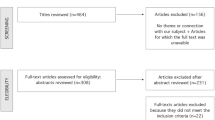Abstract
Resisting the will to empathise with a focalised character is assumed to be difficult for young readers, yet empirical evidence on how they actually respond is limited. This paper combines recent insights gleaned from cognitive literary studies with a small-scale empirical study of thirty-five Swedish adolescents reading an Irish short story in order to investigate how teenagers respond to a text which is strongly focalised through a single character. The students were asked to rewrite the events in the story from another character’s point of view. Their texts were coded and analysed, as were follow-up interviews with six students. The findings indicate that Swedish-speaking teenage readers rarely have difficulty resisting focalisation, but they often struggle with irony.
Similar content being viewed by others
Notes
One student wrote that he agreed with Jackie’s interpretation of the events and provided parallels from his own family life. Another student attempted to retell the story, but retained Jackie’s perspective. The focalisation of the narrative may have been irresistible to both students, or they may have simply misunderstood the task. Both were excluded from our study because we were unable to determine what the texts reveal about the students’ understanding of the story.
Several students chose names that did not reflect their sex. Readers should not assume they know the sex of those we cite.
In qualitative research like ours, where one is endeavouring not to manipulate the conditions but rather to capture the day-to-day reality of education, the term “ecological validity” is used to describe the extent to which the data reflect the “normal” situation.
References
Aerila, Juli-Anna. (2010). Fiktiivisen Kirjallisuuden Maailmasta Monikulttuuriseen Suomeen. Enakointikertomus Kirjallisuudenopetuksen ja Monikulttuurisuuskasvatuksen Välineenä. Turku: University of Turku Press.
Bawden, Nina. (1973). Carrie’s War. Harmondsworth: Penguin.
Berger, David. (1987). Clinical Empathy. Lanham: Jason Aronson.
Booth, Wayne C. (1974). A Rhetoric of Irony. Chicago: University of Chicago Press.
Bouton, Lawrence F. (1999). Developing Nonnative Speaker Skills in Interpreting Conversational Implicatures in English: Explicit Teaching Can Ease the Process. In E. Hinkel (Ed.), Culture in Second Language Teaching and Learning (pp. 47–70). Cambridge: Cambridge University Press.
Bruner, Jerome S. (1990). Acts of Meaning. Harvard: Harvard University Press.
Cohn, Dorrit. (1983). Transparent Minds: Narrative Modes for Presenting Consciousness in Fiction. Princeton: Princeton University Press.
Didion, Joan. (1976). Why I Write. The New York Times Magazine, p. 5.
Foerstel, Herbert N. (2002). Banned in the USA: A Reference Guide to Book Censorship in Schools and Public Libraries. Westport: Greenwood.
Haapakoski, Seija. (2011). Ironian kääntäminen lasten- ja nuortenromaaneissa. Esimerkkinä Christine Nöstlingerin teokset Ein Mann für Mama ja Luki-live. Tampere: Tampere University Press.
Hansen, Per Krogh. (2008). First Person, Present Tense. Authorial Presence and Unreliable Narration in Simultaneous Narration. In Elke D’hoker and Gunther Martens (Eds.), Narrative Unreliability in the Twentieth-Century First-Person Novel (pp. 317–38). Berlin: De Gruyter.
Hartnett, Sonya. (2008). The Ghost’s Child. Somerville: Candlewick Press.
Hogan, P.C. (2003). The Mind and its Stories: Narrative Universals and Human Emotion. Cambridge: Cambridge University Press.
Keen, Suzanne. (2007). Empathy and the Novel. New York and Oxford: Oxford University Press.
Kokkola, Lydia. (2013). Learning to Read Politically: Narratives of Hope and Narratives of Despair in Push by Sapphire. Cambridge Journal of Education, 43(3), 391–405.
Mackey, Margaret. (2011). Narrative Pleasures in Young Adult Novels, Films, and Video Games. Houndmills: Palgrave Macmillan.
Nikolajeva, Maria. (2010). Literacy, Competence and Meaning-making: A Human Sciences Approach. Cambridge Journal of Education, 40(2), 145–159.
Nikolajeva, Maria. (2014). Reading for Learning: Cognitive Approaches to Children’s Literature. Amsterdam: John Benjamins Press.
Nussbaum, Martha C. (2003). Upheavals of Thought: The Intelligence of Emotions. Cambridge: Cambridge University Press.
O’Connor, Frank. (1982). First Confession. In Collected Stories (pp. 175–182). New York: Vintage Books. First published in 1951.
Sapphire. (1996). Push. New York: Vintage Books, Random House.
Sipe, Lawrence R. (2007). Storytime: Young Children’s Literary Understanding in the Classroom. New York: Teachers College Press.
Skolverket. (2011). Course Plan for English at Upper Secondary School. Retrieved 1 February 2014 from http://www.skolverket.se/polopoly_fs/1.174543!/Menu/article/attachment/English%20120912.pdf.
Stephens, John. (2013). Editorial: Thinking in Other Ways. International Research in Children’s Literature, 6(2), v–xi.
Vermeule, Blakey. (2011). Why Do We Care About Literary Characters? Baltimore: Johns Hopkins University Press.
Wall, Barbara. (1991). The Narrator’s Voice: The Dilemma of Children’s Fiction. Basingstoke: Macmillan.
Zar, Rose. (1983). In the Mouth of the Wolf. Philadelphia: Jewish Publication Society of America.
Acknowledgments
The research for this article was funded by The Marcus and Amalia Wallenberg Foundation.
Author information
Authors and Affiliations
Corresponding author
Additional information
Eva Fjällström is writing her PhD on literary texts in EFL education under a cotutelle agreement between Åbo Akademi University (Finland) and Luleå University of Technology (Sweden).
Lydia Kokkola is Professor of English and Education at Luleå University of Technology. Her main areas of research include reading in a foreign language, Holocaust studies and adolescent fiction. Her most recent study, Fictions of Carnality, has been published by John Benjamins.
Rights and permissions
About this article
Cite this article
Fjällström, E., Kokkola, L. Resisting Focalisation, Gaining Empathy: Swedish Teenagers Read Irish Fiction. Child Lit Educ 46, 394–409 (2015). https://doi.org/10.1007/s10583-014-9238-7
Published:
Issue Date:
DOI: https://doi.org/10.1007/s10583-014-9238-7




